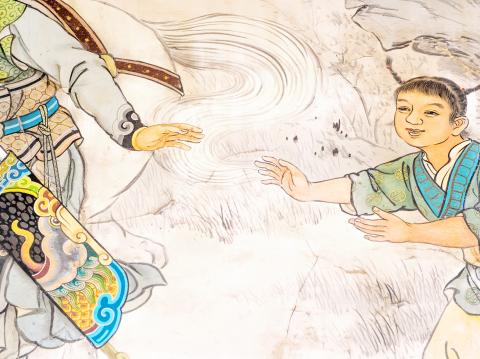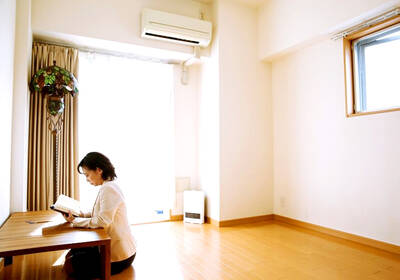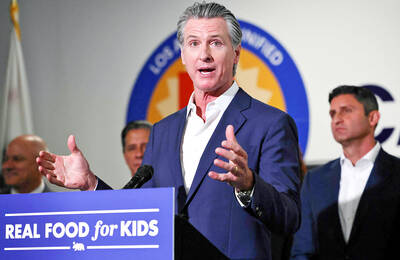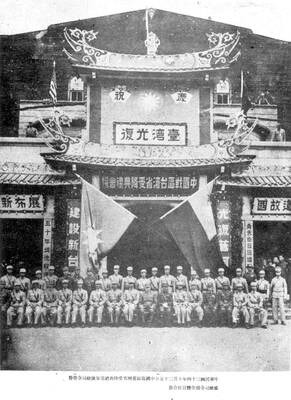Chinese practice
雞犬升天
(ji1 quan3 sheng1 tian1)

Photo: Paul Cooper, Taipei Times
照片:台北時報記者古德謙攝
這句成語的出處是東漢王充所寫的《論衡》,講的是淮南修道的太子劉安成仙的故事。王充在書中提到:「王遂得道,舉家升天。畜產皆仙,犬吠於天上,雞鳴於雲中。此言仙藥有餘,犬雞食之,并隨王而升天也。」意即:劉安得道升天成仙,但家裡還留有幾顆他修道成仙用的仙丹,這些仙丹被他家的狗跟雞吃了,結果他家的雞跟狗也跟著升天了,跟劉安一起在天上作伴。這本書後面接著說:「好道學仙之人,皆謂之然。此虛言也。」也就是說:那些嚮往修道成仙的人,都相信這是千真萬確的事蹟,但事實上並沒有這種事。雞犬升天這個故事後來便引伸出來,表示當一個人飛黃騰達了,他身邊的親友也跟著扶搖直上。(台北時報詹豐造譯)
艾蜜麗當了老闆後,她的那些親朋好友一個個都雞犬升天了。
(After Emily became the boss, her friends started getting promoted, one after the other.)
人心難測,你真的相信你的朋友一旦當了經理,你就可以雞犬升天了?
(You’re kidding, right? Do you really think that you’ll be on your way up the minute your mate makes manager?)
英文練習
Riding on the coattails of others
This proverb derives from a reference to when the Taoist master, Prince Liu An of Huainan, in the Eastern Han book Lun Heng written by Wang Chong, achieved immortality. In the book, Wang writes that the prince ascended to Heaven as an immortal, and had left some of the drug of immortality around his courtyard. His dogs and chickens ate it and ascended to Heaven to join him. The book goes on to say that, although many interested in Taoism would love to believe this story, there was little truth in it. Following on from this, the proverb 雞犬升天 — literally “the chicken and dogs ascend to Heaven” — is used to refer to people who achieve success by virtue of the ability or merit of friends, relatives or other people they know.
In English, we can describe this situation by saying that these people have gotten where they are “riding on the coattails of others.”
(Paul Cooper, Taipei Times)
He hasn’t worked for his success. He has got where he is riding on the coattails of his father.
(他的成就不是靠自己努力來的。他能有今天的地位全是靠他老爸的庇廕。)
You cannot rely on hitching a ride on the back of someone else’s hard work.
(你不能成天只想依靠別人努力的成果,攀援富貴。)

A: Is K-pop still popular now? B: Sure! The 110,000 tickets for supergroup Blackpink’s two shows to be held this weekend were all snatched up within three minutes. A: Apart from Blackpink, what other K-pop stars are visiting? B: I-dle’s Taiwanese member Yeh Shu-hua, King of K-pop G-Dragon, and Super Junior are all coming soon next month. A: Super Junior’s 2009 hit “Sorry, Sorry” boosted this Korean “Hallyu” to a peak. Let’s go experience SJ’s magic again. A: 韓國流行音樂還是很受歡迎嗎? B: 當然啦,光是天團Blackpink本週末兩場演唱會,11萬張門票3分鐘內就被秒殺! A: 除了Blackpink,還有哪些韓國歌手最近會來台? B: I-dle的台灣成員葉舒華、韓流天王G-Dragon權志龍、Super Junior下月也都將來台。 A: Super Junior 2009年金曲《Sorry, Sorry》曾將「韓流」推上高峰,我們再去重溫一下SJ的魔力吧。

In today’s fast-paced world, many individuals are turning to alternative lifestyles that prioritize sustainability and simplicity. Two such lifestyles are sustainable living and minimalism. They both share some common threads: living more intentionally, reducing our environmental impact, and focusing on what truly matters. 1. Sustainable Living Sustainable living is about making choices that are environmentally friendly in every aspect of one’s life. The primary goal is to minimize one’s ecological footprint, conserve natural resources, and reduce waste. It might sound abstract, but in fact, it is rather easy to practice sustainable living. What we eat has a great impact on the environment. Small

California will phase out certain ultra-processed foods from school meals over the next decade under a first-in-the-nation law signed on Oct. 8 by Gov. Gavin Newsom. The law seeks to define ultra-processed foods, the often super-tasty products typically full of sugar, salt and unhealthy fats. The legislation requires the state’s Department of Public Health to adopt rules by mid-2028 defining “ultra-processed foods of concern” and “restricted school foods.” Schools have to start phasing out those foods by July 2029, and districts will be barred from selling them for breakfast or lunch by July 2035. Vendors will be banned from providing the “foods

對話 Dialogue 清清:華華,你知道這禮拜為什麼又有三天連假嗎? Qīngqing: Huáhua, nǐ zhīdào zhè lǐbài wèishénme yòu yǒu sān tiān liánjià ma? 華華:知道啊!10月25號是臺灣光復節,從今年起,又是可以放假的國定假日了。剛好碰到禮拜六,所以禮拜五多補一天假。 Huáhua: Zhīdào a! Shí yuè èrshíwǔ hào shì Táiwān Guāngfù Jié, cóng jīnnián qǐ, yòu shì kěyǐ fàngjià de guódìng jiàrì le. Gānghǎo pèngdào lǐbài liù, suǒyǐ lǐbài wǔ duō bǔ yì tiān jià. 清清:對了! 我想起來了,聽我爸媽說過,以前十月有好幾天都放假,光復節是其中之一。 Qīngqing: Duìle! Wǒ xiǎng qǐlái le, tīng wǒ bàmā shuōguò, yǐqián shí yuè yǒu hǎojǐ tiān dōu fàngjià, Guāngfù Jié shì qízhōng zhī yī. 華華:光復節是慶祝日本人在二次世界大戰結束後,離開臺灣的日子。 Huáhua: Guāngfù Jié shì qìngzhù Rìběn rén zài Èrcì Shìjiè Dàzhàn jiéshù hòu líkāi Táiwān de rìzi. 清清:那是一九四五年的事了。 Qīngqing: Nà shì yī jiǔ sì wǔ nián de shì le. 華華:沒錯,對臺灣來說,是很重要的歷史。 Huáhua: Méicuò, duì Táiwān